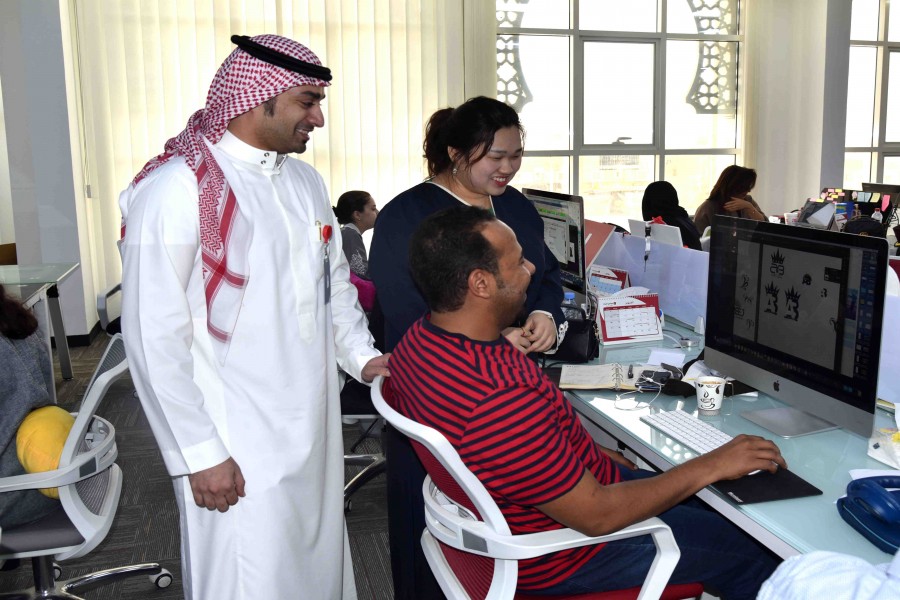A vintage gramophone with a white porcelain horn and antique brass wooden base is the best product that Egyptian girl Maya Yusuf has bought on the e-commerce platform.
Her father died when she was 16 years old, leaving behind her unemployed mother, five girls, and a gramophone, which was bought from Europe but has been discarded due to damage.
"A little bit expensive for me, but to buy an exactly same one was hard to imagine before," Yusuf said about the gramophone on the internet, adding that the squeak of the metal stylus moving on record discs brought back memories of happy old days with her father.
What the e-commerce industry has given Yusuf is far more than the gramophone.
After graduation, she joined a Chinese technology company before she became public relations director of the United Arab Emirates branch of Jollychic, an online retailer operated by a Chinese e-commerce company named Jolly Information Technology Co. Ltd based in the eastern Chinese city of Hangzhou. With a good salary, she became the breadwinner of her family and began her business.
Yusuf believed that Chinese e-commerce platforms could boost upper-end industrial chains in the new market of the Middle East.
The Mideast population has reached about 490 million with a huge share of youth. According to "YOUTHPOLICY," a think tank based in Germany, the number of people aged 15-29 in the region have been over 108 million in 2018, accounting for 28 per cent of the population.
In addition, compared with the global average age of 28, the average age of the Arab countries is only 22 years old, making the region one of the youngest in the world.
Young people are more receptive to emerging lifestyles such as online shopping. Especially in the six oil-rich gulf countries, e-commerce has been developing rapidly.
According to a research report released this year by the well-known Chinese industry information news website "36Kr," Saudi e-commerce sales amounted to 8.7 billion US dollars in 2017 and are expected to reach 13.9 billion dollars in 2021.
Abdullah Mohamed, an economist with the Mideast business news website Zawya, said that guided by the Saudi "2030 Vision" plan, the Saudi government plans to increase the contribution of e-commerce and modern trade to 80 per cent of the retail industry by 2020.
Jollychic, the Chinese e-commerce company Yusuf is serving, started business in Saudi Arabia and has expanded the Gulf market in the past years. The number of users have exceeded 50 million, and its mobile App download has ranked top three among competitors for more than three years.
Besides integrated operation centres and warehouses in Saudi Arabia and the United Arab Emirates, the company also has a customer service centre in Jordan. The total number of employees in the area is about 2,000, including a large number of local employees.
Abdul Aziz Shahari from Abu Dhabi is one of Yusuf's co-worker in the Riyadh office. The Saudi government requires that 31 per cent of the total number of employees of foreign companies be locals. Jollychic, with 35 per cent of local employees, has always been praised by the local government as a model for foreign companies that provide job opportunities.
Local people "contribute identity, not energy," which was the impression many foreign companies have on local employees. However, e-commerce companies that have prospered in the Gulf market have become "dream places" for young local workers. Shahari, who joined the company for only one year, said "there are new things every day, how exciting."
Chinese companies came with rich experience in e-commerce marketing. At the beginning of this year, Jollychic built the first 24-hour "smart shop" in a large shopping mall in Riyadh. Customers could use smart phones to scan a code, open the door, self-purchase, and self-pay. The red container design not only drew attention of pedestrians in the shopping mall, but also became a popular site for tourists.
Shayma Hilal, head of Egypt-China Technology Transfer centre, in Cairo, said that e-commerce has developed rapidly in the Middle East in the past four years.
"It is forming a new lifestyle and still facing broad prospects," Hilal said. Aside from the online magnate Amazon, Chinese platforms AliExpress, Shein, Jollychic, Zaful have earned good reputation.
Egyptian engineer Abdullah Abdu Al-Fatah said that with rich merchandise, diverse styles, high qualities and good prices, minus the labour of walking, online shopping has become his main choice.
Moreover, Chinese brands, designs and products have been sailed to the countries and regions along the Belt and Road. Xiaomi, Haier and Huawei have become household names in many countries outside China.
Riyad Fakhri, director of Belt and Road China-Morocco Joint Research Institute, said that the logistics industry will also bring vitality to the Mideast countries at the "Online Silk Road Forum" of China-Arab Expo, which is held on Sept. 5-8 in Yinchuan, capital of China's northwestern Ningxia Hui Autonomous Region.
The Chinese e-commerce companies at present in the United Arab Emirates and Saudi Arabia have cooperated with local logistics companies to launch the "Next Day" delivery service, which has greatly enhanced the experience of online shopping.
The online shopping parcels in Egypt and other countries still take two to three weeks to arrive. "With the participation of the private sector, the logistics industry will develop rapidly," said Fakhri.
Yusuf believes that Chinese companies have also brought a hard-working culture to the local people.
In the past few years, she has followed Chinese companies to develop overseas markets, from Beijing to Colombo, Hong Kong to Jakarta, and Shanghai to Dubai.
"Keeping your original aspiration leads you to success," she said.


